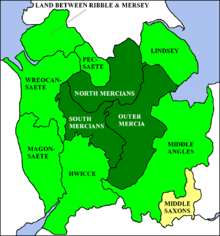Religion in Mercia

Throughout its history the Kingdom of Mercia was a battleground between conflicting religious ideologies.
Early history
It is likely that the Anglian occupation of Mercia saw the displacement of, or integration with, Sub-Roman British tribes. There is a possibility that some of these British Christian communities survived the Anglo-Saxon occupation: Richard Fletcher mentions Much Wenlock[1] as a possible candidate.
The first kings of Mercia were pagans, and they resisted the encroachment of Christianity longer than those of other kingdoms in the Anglo-Saxon
Mercian rulers remained resolutely pagan until the reign of Peada in 656, although this did not prevent them joining coalitions with Christian Welsh rulers to resist Northumbria. The first appearance of Christianity in Mercia, however, had come at least thirty years earlier, following the Battle of Cirencester of 628, when Penda incorporated the largely Christian West Saxon territories of the Hwiccas into his kingdom.
The Mercian Supremacy
Reign of Penda
The conversion of Mercia to Christianity occurred in the latter part of the 7th century, and was carried out almost entirely by Northumbrian and Irish monks of the Celtic Rite. Penda remained pagan to the end, but by the time of his defeat and death, Mercia was largely surrounded by Christian states. As such, it was excluded from many of the networks of diplomacy and alliance that extended through Western Europe, as these generally involved dynastic marriages and ecclesiastical negotiation. Christianity gained a foothold in Mercia precisely through these channels. Part of the price of Oswiu's support for Peada as sub-king of the Middle Angles, during the period of Mercian eclipse, was that Peada marry Oswiu's daughter, Alchflaed, and accept her religion.[3] Diuma, an Irish monk and one of Oswiu's missionaries was subsequently ordained a bishop—the first to operate in Mercia. Peada founded an abbey at Medeshamstede, in modern Peterborough, as earnest of his support for the Church. Bede tells us that Penda respected the Christians and even allowed them to operate more widely in Mercia. However, it seems that not much progress was made at converting the nobles and people of Mercia.
The mission of Chad
After an inconclusive start, decisive steps to Christianise Mercia were taken by Chad (Latinised by Bede as Ceadda), the fifth[4] bishop to minister to the Mercians. He was a controversial figure, who had been removed from his duties among the Northumbrians by the Archbishop Theodore of Tarsus.[5] Finding his realm without a bishop in 669, King Wulfhere requested Theodore to send one,[6] and Theodore despatched Chad. Wulfhere gave him land to build a monastery at Lichfield which is around 7 miles (11 km) north-west of Tamworth. These early bishops were known as bishops of the Middle Angles and/or the Mercians and, in Chad's case, also of the Lindsey people: bishoprics were still ethnic rather than territorial, according to Celtic tradition. Chad tirelessly evangelised Mercia, and Bede credits him with the conversion of the kingdom, despite the briefness of his episcopate—less than three years.
The sons of Penda not only supported Christian missionaries but invested heavily in the Church. Wulfhere greatly endowed the family monastery at Medeshamstede. In addition to the gift of land at Lichfield, he also gave Chad land for a monastery at Barwae—probably the modern Barrow upon Humber. Merewalh, sub-king of the Magonsæte, to the west, in modern Shropshire and Herefordshire, and apparently a brother or half-brother of Wulfhere, fathered a dynasty of abbesses, endowing an abbey at Leominster and probably also that at Much Wenlock, which his daughter Mildburh headed. As in other Anglo-Saxon kingdoms, the many small monasteries allowed the political/military and ecclesiastical leadership to consolidate their unity through bonds of kinship.[7]
Division of Mercia into dioceses

However, Mercia did not long survive as an ecclesiastical entity. Chad's successor,
The Danelaw
In 867, under
References
- ISBN 0-00-255203-5.
- ISBN 0-7185-1395-9.
- ^ Bede. Ecclesiastical History of the English People. pp. Book 3, chapter 21.
- ^ Bede. Ecclesiastical History of the English People, Book 3, chapter 24.
- ^ Bede. Ecclesiastical History of the English People. pp. Book 4, chapter 2.
- ^ Bede. Ecclesiastical History of the English People. pp. Book 4, chapter 3.
- ISBN 0-00-255203-5.
